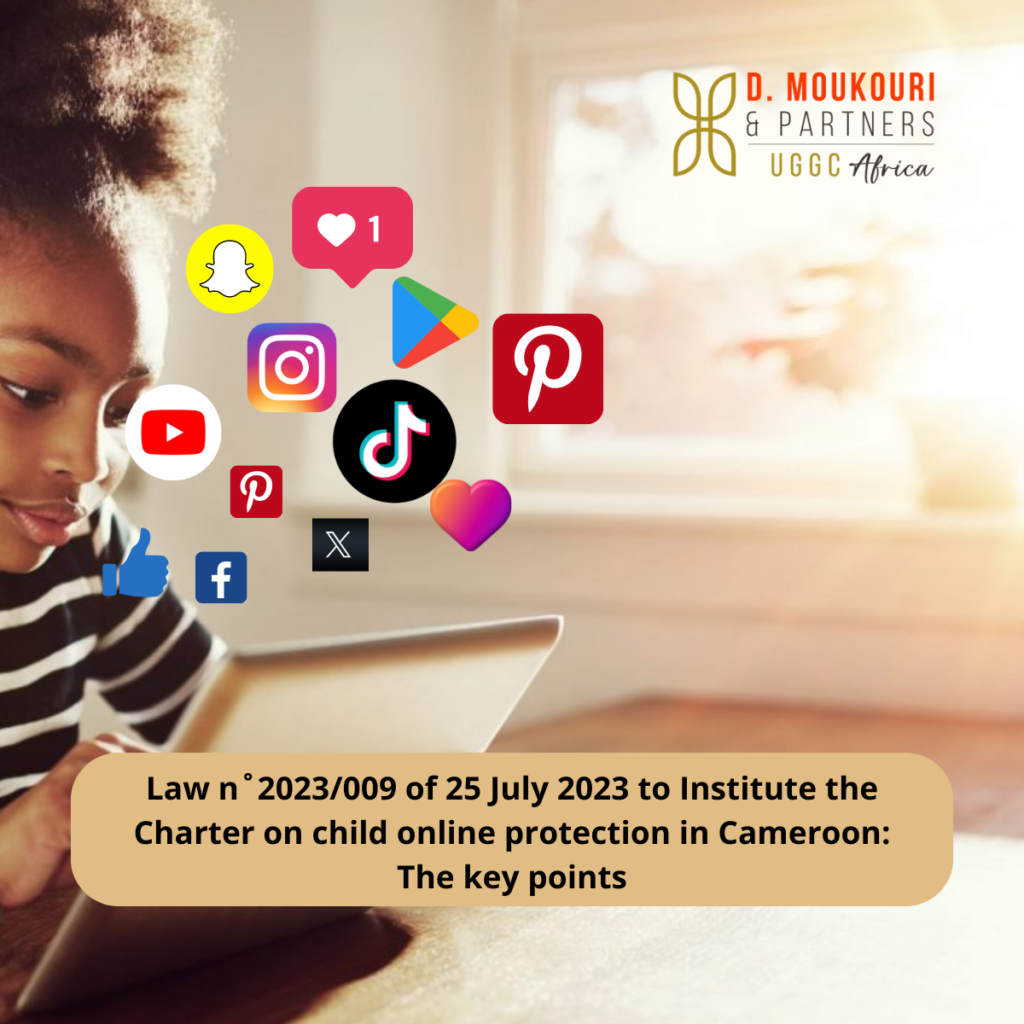
In today’s digital age, children who are very much present in cyberspace can be exposed to a variety of dangers (bullying and harassment, deviant and offensive content, fake news etc…). Protecting children online has become an ever-growing concern that led to the adoption of Law no. 2023/009 on the Charter for the Protection of Children Online in Cameroon, on July 25th, 2023.
The key points of the Law are as follows:
- Drawing up a national action plan to protect children online (Article 5)
Article 5 of the law provides that the Ministry of Posts and Telecommunications and other relevant authorities must draw up a national action plan to protect children online, in order to guarantee children secure access to the Internet for their learning and skills development, to raise awareness on the harmful effects of the Internet among those involved in the child protection chain, and to take account of children’s vulnerability and the need to protect them from certain dangerous content.
- Training and awareness workshops organised by several public authorities (Articles 6,7,8,9,10)
The enactment of the law on child protection has saddled some public authorities with the responsibility of enlightening the public on the use of internet for children. Several public authorities, such as the Ministries of Education and Youth, Posts and Telecommunications, Promotion of Women and the Family, Social Affairs and Communication. The aim of these public authorities is geared towards creating teaching modules and coaching sessions for parents on the awareness and use of the internet by children. This will enable them to prevent and detect online abuse of children.
- The involvement of private-sector players in protecting children online (Articles 11, 12, 13, 14)
Private-sector players now play an equal and pivotal role with public authorities in securing the national cyberspace for children. These include: internet service and content providers, information system operators, social network promoters, online advertising professionals and audiovisual communication operators.
These key players will actively be involved in raising awareness and educating children about non-eligible and dangerous sites.
- A liability regime with administrative and criminal sanctions
The law is designed to protect children. The various players in the cyberspace may be held liable when children dignity is compromised.
As a general obligation, those involved in the cyberspace must put an end to all indexing of content that offends the dignity of children. They will bring such content to the attention of the competent authorities.
As a specific obligation, parents, regulatory bodies and public authorities are required to ensure the circulation of relevant information relating to the use of internet and online resources available to under-age users. This compliance mechanism will serve as a guide to indicating good practice in the cyberspace and dangerous activities in the course of using the internet.
Furthermore, the law imposes two categories of sanctions to wit: administrative and criminal sanctions. Administrative sanctions are essentially financial compensation, while criminal sanctions range from fines and imprisonment to temporary bans, and closures.
- Setting the age of numerical majority (Article 3)
Article 3 of the law defines the age of digital majority. The law defines a child as any person under the age of 18 years.
This is the first law defining digital majority in Cameroon.
The protection afforded by this law is directed at children who have not attained the age of 18. In enacting this law, the legislator envisaged that, anyone over this age is capable of giving valid legal consent online without duress or vitiating circumstances and is also mentally apt and capable of appreciating the deviant or dangerous nature of certain contents.
- A properly defined repression circuit (Article 28 et seq.)
In the event of a breach of their statutory obligations, internet service providers and other designated private players are given 15 days’ notice to comply. This notice is sent to them by the body in charge of ICT regulation. After this deadline, if they have not complied with the formal notice, the regulatory body is entitled to impose penalties.
The 15-day deadline set by the formal notice takes into account the urgent need to put a stop to any attack on the dignity of children in cyberspace, given their vulnerability, and the speed with which erroneous and even dangerous content can be shared widely in cyberspace.


